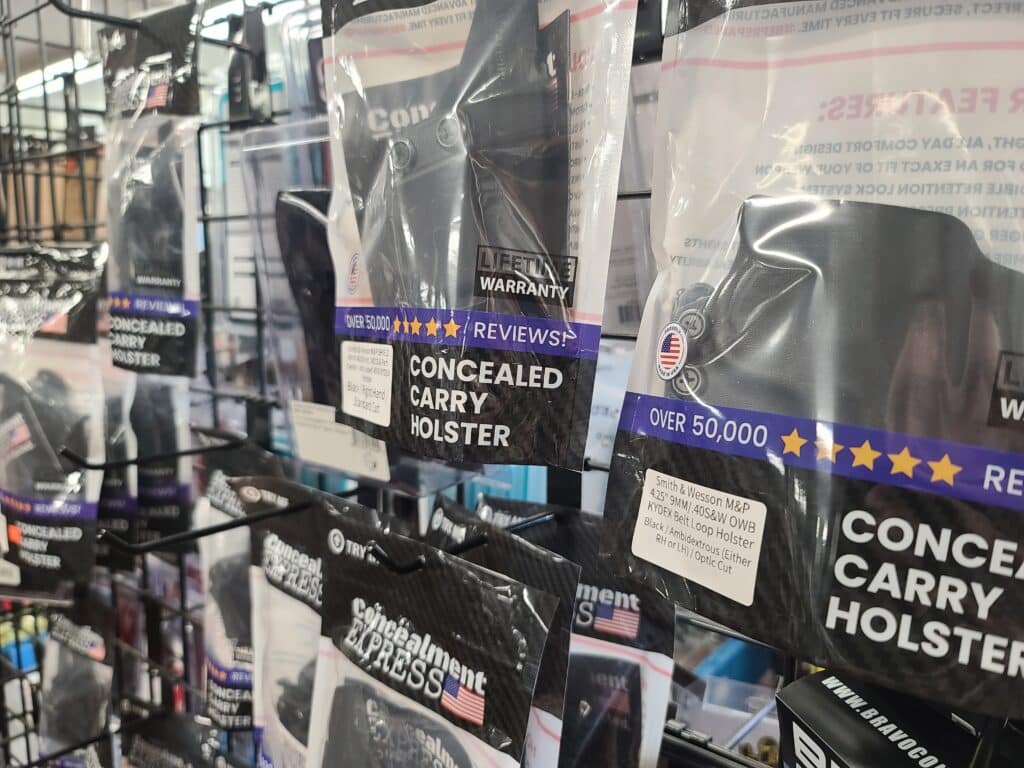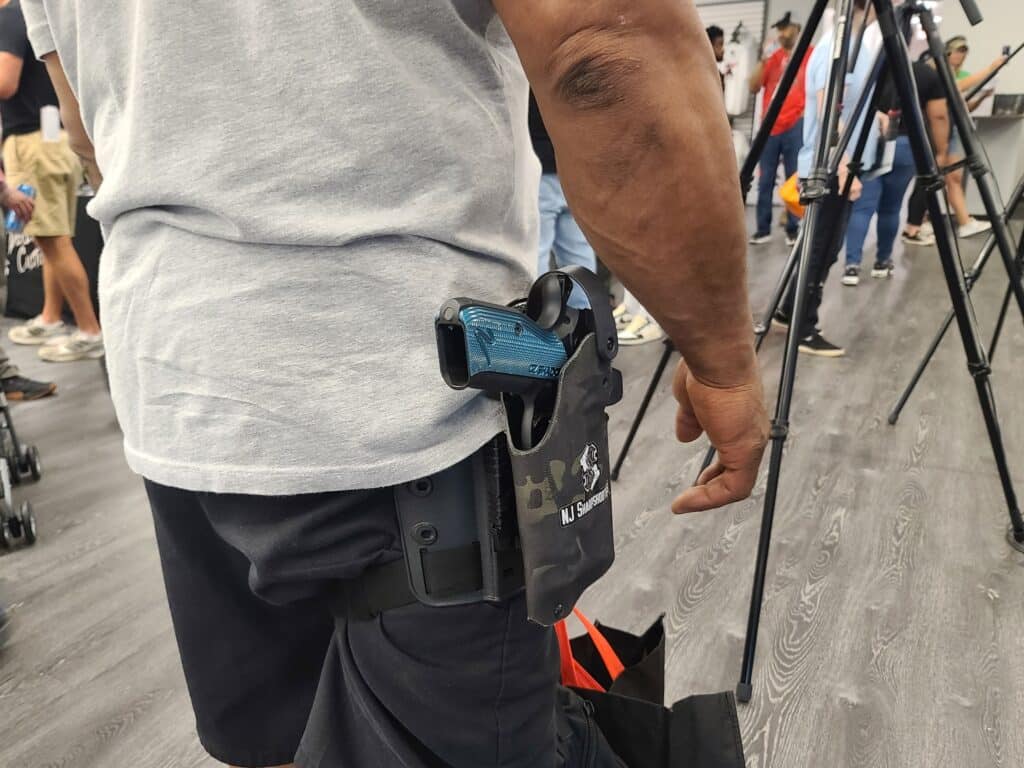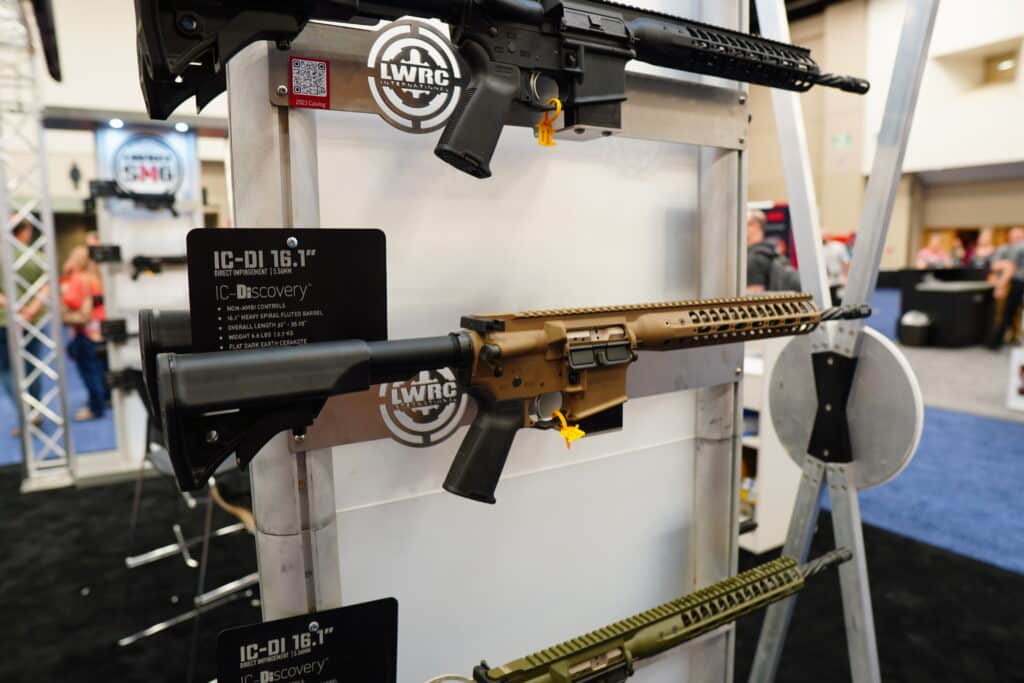We had some breaking news on Friday. For the first time, a federal appeals court ruled on a Bruen-response law. That ruling was decidedly… mixed.
Earlier in the week, we saw a new lawsuit filed against California. It’s probably the most closely related to the core holding in Bruen of any case to this point. And Contributing Writer Jake Fogleman explains how one aspect of the suit could affect everyone across the country.
I also take a look at the doomed attempt to bring an “assault weapons” ban to the Senate floor. It didn’t tell us a whole lot, by design, but it did give us some new insight into the fight over AR-15s and other guns.
Plus, a pollster behind the survey showing a huge jump in gun ownership joins the podcast to explain the poll’s political implications.

Analysis: Why a California Gun-Rights Suit Could Have a National Impact [Member Exclusive]
By Jake Fogleman
The Golden State is back in court over gun-carry permits. This time, the ramifications of the suit could extend well beyond the state’s borders.
A coalition of gun-rights groups led by the California Rifle and Pistol Association (CRPA) filed a new federal lawsuit against the Los Angeles County Sheriff’s Department, La Verne Police Department, and California Attorney General Rob Bonta (D.) on Monday. The suit alleges that each jurisdiction violated the Second Amendment rights of gun-carry permit applicants in different ways.
The primary thrust of the lawsuit is over Los Angeles County’s permit procedures, particularly their application processing times and high fees. It alleges that the Sheriff’s Department often takes 15 months or longer to process applications despite state law specifying a 120-day limit. Meanwhile, the city of La Verne, a municipality within Los Angeles County, charges roughly $1,000 in various fees for carry permit applicants, an amount the groups say makes the city an outlier and is unconstitutionally excessive.
However, the claim against the attorney General is more significant since it may have a nationwide impact. Because California does not issue permits to applicants who live outside the state, and since Bonta has not entered into any reciprocity agreements to recognize licenses issued by authorities in other states, the complaint argues that California is violating the Second Amendment rights of non-residents who have no legal avenue whatsoever to carry a firearm in public for self-defense within the state’s borders.
If plaintiffs win on the Los Angeles County claims the effect would be significant but limited to current county residents. A win on the non-resident claim, however, would open up the potential for residents of the other 49 states to carry for the first time in what routinely ranks in the top 3 most visited states in the country each year. That’s a far more substantial expansion of gun-carry rights in practical terms.
The groups seem to have a solid chance of winning in court. The legal claims raised in the suit are relatively straightforward, considering the fact that they deal with issues that were directly addressed by the Supreme Court in New York State Rifle & Pistol Association v. Bruen. In the same majority opinion striking down subjective may-issue laws like the one California used to have, Justice Clarence Thomas warned government officials against putting objective licensing regimes “toward abusive ends.”
“To be clear, nothing in our analysis should be interpreted to suggest the unconstitutionality of the 43 States’ ‘shall-issue’ licensing regimes, under which ‘a general desire for self-defense is sufficient to obtain a [permit],’” he wrote. “That said, because any permitting scheme can be put toward abusive ends, we do not rule out constitutional challenges to shall-issue regimes where, for example, lengthy wait times in processing license applications or exorbitant fees deny ordinary citizens their right to public carry.”
Of course, an official judicial determination would need to be made on what constitutes a “lengthy wait time” or “exorbitant fees.” But even under the most generous interpretation, processing times spanning almost the entire duration of a carry permit’s validity and fees that climb into the thousands seem likely to fit the bill.
Furthermore, California’s categorical denial of carry rights to certain people based on where in the country they call home seems difficult to square with Bruen‘s core holding recognizing a general right to carry a firearm in public. That’s the view District Court Justice John F. Coffey took when dismissing charges against a New Hampshire man for carrying without a permit in Massachusetts.
“An individual only loses a constitutional right if he commits an offense or is or has been engaged in certain behavior that is covered by 18 USC section 922,” he wrote on August 3rd in Commonwealth of Massachusetts v. Dean F. Donnell. “He doesn’t lose that right simply by traveling into an adjoining state whose statute mandates that residents of that state obtain a license prior to exercising their constitutional right. To hold otherwise would inexplicably treat Second Amendment rights differently than other individually held rights.”
He also found there was “no historical precedent limiting the reach of one’s exercise to a federal constitutional right to only within that resident’s states borders.”
But the exact outcome remains unpredictable, especially since it’s not certain how much federal courts will be willing to micromanage state’s permit requirements. California is currently one of only two states in the entire country that simultaneously does not recognize carry permits from any other state and does not offer any form of non-resident carry permit. Hawaii is the other.
Nine states—Connecticut, Illinois, Maryland, Massachusetts, New Jersey, New York, Oregon, Rhode Island, and the District of Columbia—similarly do not recognize any other state’s permit. But they do offer non-resident carry permits with varying conditions for eligibility.
If their current law is thrown out, California will likely seek to emulate those states since their model would allow the state to retain authority over the application terms for a carry permit while still creating an option for non-residents.
The other model, which the plaintiffs in the case are arguing for, is a form of court-ordered reciprocity agreement binding the state to recognize other states’ legally issued carry permits. The plaintiffs claim that the Supreme Court’s precedent in its Obergefell v. Hodges decision, which held that states must recognize same-sex marriage licenses legally issued in other states, should be adopted here too.
“This holding and its logic, with respect to an unenumerated right, apply just as much to the enumerated right to bear arms, and thus applies equally to CCW permits issued by other states as the Supreme Court instructs that it does to marriage licenses issued by other states,” the complaint reads.
It’s a far more ambitious ask of the judge in the case than simply requiring a non-resident permitting system. It would also undoubtedly be more impactful in terms of who would be eligible to carry when visiting the state in the future and how quickly they could qualify.
Of course, the lawsuit is still in its early stages, and a favorable ruling for gun-rights advocates is not a certainty. Nevertheless, under the direction given to courts by Bruen, it seems likely that in the not-too-distant future, more gun owners could find themselves eligible to legally carry a firearm in California.
Podcast: NBC Pollster Unpacks Gun Ownership Spike, Political Implications [Member Early Access]
By Stephen Gutowski
NBC News recently released one of the most impactful polls on gun ownership in America. So, it’s time to take a deep dive into what it tells us.
Who better to do that with than one of the analysts who actually conducted the poll? That’s why we have Micah Roberts of Public Opinion Strategies on the show this week. He and his company run surveys for NBC, CNBC, and a number of political operations.
He said the biggest takeaway from the latest NBC poll on guns was the substantial spike in ownership, especially among Democrats and suburban voters. He noted gun ownership has increased ten points in just ten years, which he argued is highly unusual because gun ownership is a trait that tends not to swing much over time. He also pointed out the remarkable 17-point increase in gun ownership among Black Americans.
Roberts explained how the poll found, like many others before it, that gun ownership has a significant effect on how people view gun control. Gun owners, as you might expect, are less likely to support new gun restrictions. So, the influx of new gun owners could shape the nation’s gun politics.
However, he also identified a surprising trend. Democrats have seen the greatest increase in gun ownership since the poll started. But they’ve also seen the greatest increase in concern the government won’t do enough to restrict access to guns. He said there is still an identifiable difference in how Democrats view guns based on whether they own one, but partisanship appears to have a greater effect on those views.
Plus, Contributing Writer Jake Fogleman and I talk about the failed Senate “assault weapons” ban vote.
You can listen to the show on your favorite podcasting app or by clicking here. Video of the episode is available on our YouTube channel. Reload Members get access on Sunday, as always. The show goes public on Monday.

Appeals Court Rules Parts of New York Gun-Carry Law Unconstitutional, Upholds Others
By Stephen Gutowski
The Second Circuit just became the first federal court of appeals to rule on new gun-carry restrictions in the wake of last year’s landmark Supreme Court case.
A three-judge panel delivered a unanimous, but mixed, ruling Friday. It found some of the latest restrictions imposed by New York’s Concealed Carry Improvement Act (CCIA), like the ban on carrying guns on private property open to the public, were likely unconstitutional. But it also ruled some, such as requiring permit applicants to meet a subjective “good moral character” standard, were not.
“Given that most spaces in a community that are not private homes will be composed of private property open to the public to which § 265.01-d applies, the restricted location provision
functionally creates a universal default presumption against carrying firearms in public places, seriously burdening lawful gun owners’ Second Amendment rights,” the panel wrote in an unsigned opinion in Antonyuk v. Chiumento, which consolidated several lower court cases. “That burden is entirely out of step with that imposed by the proffered analogues, which appear to have created a presumption against carriage only on private property not open to the public.”
The ruling is a setback for lawmakers who hoped to severely limit lawful gun carry even after the Supreme Court ruled carrying a gun in public was a right protected by the Second Amendment in New York State Rifle and Pistol Association v. Bruen. Most states that had their previous carry regimes struck down under the ruling, including New York itself, responded by broadly expanding what qualified as a “sensitive place” that’s off-limits for gun carry. Friday’s ruling is the first where an appeals panel has agreed these kinds of Breun-response bills have overstepped.
Beyond ruling against the ban on carrying on publicly-accessible private property, such as stores or restaurants, the panel took issue with several other CCIA provisions. It found the requirement that carry-permit applicants turn over their social media history, including unmasking any anonymous accounts they operate, unworkable.
“Social media is of course revolutionary because of the ease with which individuals can disseminate their thoughts to a large audience without the traditional barriers to publishing,” the panel wrote. “This is indeed a break from the practice of publishing newspaper pieces as ‘Publius’—we grant that Facebook likely would have baffled the Founders. But the CCIA’s social media requirement does not bear upon the aspects of social media that are new. While social media writ large may have no historical analogue, social media handles do. The frequency, formality, and barriers to dissemination of one’s views may be different, but the election of a pseudonym to hide one’s true identity is not.”
The panel also found New York’s attempt to bar lawful carry in places of worship ran into First Amendment problems. It argued the state violated the rights of plaintiff Pastor Michael Spencer and his congregation by not allowing them to decide for themselves whether guns could be carried on church property.
“[T]he CCIA is not neutral because it allows the owners of many forms of private property, including many types of retail businesses open to the public, to decide for themselves whether to allow firearms on the premises while denying the same autonomy to places of worship,” the panel wrote. “By adopting a law that applies differently as to places of worship (alongside the other enumerated sensitive places) than to most other privately owned businesses and properties, the CCIA is, on its face, neither neutral nor generally applicable.”
However, the appeals panel also upheld a number of the new gun-free zones created by the law. That could push other jurisdictions to adopt the restrictions cleared by the ruling.
Despite being a core failing of New York’s old permitting system, according to Bruen, the panel argued that the subjective “good moral character” requirement in the new law was likely not unconstitutional on its face. It argued Bruen did “not forbid discretion in licensing regimes” and said the state’s requirements were designed to root out dangerous applicants.
“[T]he requirement is not facially invalid because it is not unconstitutional in all its applications,” the panel wrote. “The CCIA’s definition of ‘character’ is a proxy for dangerousness: whether the applicant, if licensed to carry a firearm, is likely to pose a danger to himself, others, or public safety. And there is widespread consensus (notwithstanding some disputes at the margins) that restrictions which prevent dangerous individuals from wielding lethal weapons are part of the nation’s tradition of firearm regulation.”
However, it did leave open the possibility it could be unconstitutional if applied too broadly to individuals.
The panel also found numerous other gun-free zones created under the law were likely constitutional under its application of the test laid out in Bruen. It argued there were broad historical traditions for barring gun carry in parks, zoos, theaters, mental health treatment centers, or at places that serve alcohol, or during protests. Those findings undid injunctions placed by lower courts in several cases.
Both sides of the case celebrated Friday’s ruling. New York Attorney General Letitia James (D.) said it would ensure the safety of state citizens.
“Today’s decision to permit the state to enforce critical provisions of the Concealed Carry Improvement Act as the court process moves forward will help keep New Yorkers safe,” she said in a statement. “This commonsense law was enacted to keep guns out of dangerous hands and away from schools, hospitals, parks, public transportation, and other sensitive locations.”
The gun-rights groups who filed the cases that were consolidated into Friday’s ruling celebrated the panel, made up of George H. W. Bush, Barack Obama, and Joe Biden appointees, blocking several portions of the law. They argued the practical effect would be significant.
“Make no mistakes: New York wrote a law that expressly banned carrying firearms in 91% of the State,’ the Firearms Policy Coalition tweeted. “Thanks to today’s decision in our Lawsuit, that law is now unenforceable.”
Gun Owners of America described the ruling as a “rebuke” to the state’s “unconstitutional law.” But it also admitted it wasn’t a “total victory” and said it may appeal.
“It’s encouraging that the Court blocked the intrusive social media provisions, but just as intrusive are the processes needed to confirm someone is ‘of good moral character,’ which the Court has inexplicably chosen to uphold,” Sam Paredes, a board member for the sister group Gun Owners Foundation, said in a statement. “Frustratingly, much of this Court’s opinion reads like an insubordinate rebuke of the Supreme Court, which is a disgrace and cannot be allowed to stand. We are weighing action at the nation’s High Court.”
Similarly, Attorney General James vowed to keep defending the law.
“My office will continue to defend New York’s gun laws and use every tool to protect New Yorkers from senseless gun violence,” she said.
The case now returns to the lower courts for final rulings, which should be handed down in the coming weeks and months.

Analysis: The Implications of the Failed ‘Assault Weapons’ Ban Vote [Member Exclusive]
By Stephen Gutowski
The fight over AR-15s and other popular firearms took a somewhat unexpected turn this week when Senate Majority Leader Chuck Schumer (D., N.Y.) brought a ban to the floor. Its failure, and the particular way it failed, provides a lot of insight into where the fight is at in late 2023.
On Monday, Senator Schumer announced he would bring a bill to ban “assault weapons” to the floor. That was a bit of a surprise since there wasn’t any real buildup to the vote, and none of the proposed bans had been through the normal legislative process. But it did come just a week after a group of more moderate Democrats announced a rebranded ban. So, initially, it seemed this vote might be an effort to capitalize off that political momentum.
After all, three of the four co-sponsors for the Gas-Operated Semi-automatic Firearm Exclusion (GOSAFE) Act have never sponsored a ban on the sale of semi-automatic, centerfire guns with detachable magazines at issue in these bills. That gave it a better, though far from certain, chance of getting at least a majority of the Senate on board.
However, Senator Schumer did not put GOSAFE on the floor. He put up the Assault Weapons Ban of 2023 instead. That is a much more established bill, given that GOSAFE hasn’t even been assigned a bill number yet, but its ceiling seems pretty well locked in.
With just 45 sponsors, the Assault Weapons Ban of 2023 doesn’t have majority support. It couldn’t get the three Democrats backing GOSAFE as sponsors before Wednesday’s vote. Nor did any of the other three Senators who caucus with the Democrats but who haven’t backed either bill announce their support before it went to the floor. Neither did any Republican.
In fact, the only person who hadn’t already made their position clear on the bill that did speak out about it ahead of the vote was Senator Jon Tester (D., Mont.). And he came out against it.
“As a proud gun-owner and strong supporter of the Second Amendment, Senator Tester opposes banning assault weapons and will always protect the rights of law-abiding Montana gun owners,” a Tester spokesperson told The Reload on Wednesday.
That means the bill would need to pick up either the rest of the Democratic caucus or a few Republicans to even get to a majority, let alone the 60 votes needed to break a potential filibuster. But we didn’t even get to see if it could muster that because of the way it was brought to the floor. Instead of scheduling a vote on the bill itself, Senator Schumer requested unanimous consent to suspend the normal legislative rules and pass the bill immediately.
There was no hope this would actually work, and it didn’t. Senator Schumer knew, as everybody else knows, there isn’t unanimous agreement around banning guns like the AR-15 or magazines that hold more than ten rounds of ammunition. In fact, he likely did it this way because he understands the opposite is probably closer to the truth.
There probably aren’t 50 votes for an assault weapons ban in the Senate today.
It’s impossible to know how moderates who’ve resisted sponsoring an assault weapons ban, such as Senators Kyrsten Sinema (I., Ariz.) or Susan Collins (R., Maine), would vote if they were forced to take a position. But the fact that this vote was set up in a way that wouldn’t force them to do so is telling in and of itself.
A unanimous consent request allowed Senator Schumer to technically put the bill on the floor and show he was making an effort for gun-control activists without forcing any vulnerable Democrats to take a position if they didn’t want to. That Senator Tester, who is facing a tough re-election in a state where Donald Trump won 57 percent of the vote, chose to make his opposition known speaks to the dynamics of his race.
But Senator Schumer’s move and Senator Tester’s response to it also revealed the effort to ban these kinds of guns is on at least somewhat shakier ground than we knew for sure last week. As I noted in my analysis of the GOSAFE Act’s rollout, the senators who backed the bill aren’t really the ones worth watching in this political debate because they’d previously expressed support for some kind of ban on assault weapons. Instead, the Democrats to watch are Sinema, Tester, and Joe Manchin (D., W.Va.). The Republicans to watch are Senators Collins, Lisa Murkowski (R., Alaska), and Mitt Romney (R., Utah).
I reached out to all of them about Wednesday’s unanimous consent request, but only Senator Tester responded. None of the rest spoke for or against the assault weapons ban. They haven’t made any public statements on the bill either.
There’s still some possibility that the GOSAFE Act will come back around down the line for a serious legislative push. It has a better chance of getting a majority of Senators behind it than the Assault Weapons Ban of 2023 did. But “check the box” political events like Wednesday’s unanimous consent request tend to signal the Senate is going to move on to other issues rather than double down and try again. And, with election year less than a month away, moderate Democrats probably won’t want to be forced into a real vote on this issue at all. That’s especially true since the end result of getting to 50, or even 60, votes would still ultimately be messaging, given the Republican-controlled House is sure not to follow suit anyway.
That’s it for now.
I’ll talk to you all again soon.
Thanks,
Stephen Gutowski
Founder
The Reload








Only Members can view comments. Become a member today to join the conversation.